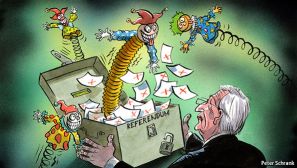A court in The Hague decided on October 14 that the charges of hate speech against Dutch politician Geert Wilders, for statements he made in March 2014 at a political rally, are admissible in a court of law. It thereby rejected the Wilders' appeal to throw out the charges as inadmissible in a court of law on the grounds that these are political issues and that a trial would in fact amount to a political process. The criminal trial against Wilders will begin on Monday, October 31.
While campaigning in The Hague in March 2014, Wilders argued the need for fewer Moroccans in the Netherlands. At an election meeting in The Hague, he asked those present a number of questions, one of which was "Do you want more or fewer Moroccans?" After the crowd responded "fewer" Wilders said, "We're going to organize that."
Because of the "fewer Moroccans" statements, repeated again in an interview a few days later, Wilders will be prosecuted on two counts: First for "deliberately insulting a group of people because of their race." Second, for "inciting hatred or discrimination against these people."
Wilders' defense attorney, Geert Jan Knoops, has argued that the trial amounts to a political trial against Wilders and his party, the PVV: "Sensitive issues must be judged by public opinion or through the ballot box,", Knoops said "The Prosecutor is indirectly asking for a ruling over the functioning of the PVV and its political program. The court must not interfere with this."
As a politician, Wilders can say more than an ordinary citizen, Knoops said, arguing that Wilders used his statements to point out shortcomings in the Dutch state. "It is his duty to name shortcomings. He takes that responsibility and proposes solutions." Knoops argued that the prosecutor is limiting Wilders' freedom of speech by prosecuting him for his statements.
The court's response was that although politicians are entitled to freedom of expression, they should "avoid public statements that feed intolerance" and that the trial would determine where the border lies between politicians' freedom of expression and their obligation, as the court sees it, to avoid public statements that feed intolerance.
Other politicians, notably all from the Labour Party, have uttered the following about Moroccans without being prosecuted:
"We also have sh*t Moroccans over here." -- Rob Oudkerk, a Dutch Labour Party (PvDA) politician.
"We must humiliate Moroccans." -- Hans Spekman, PvDA politician.
"Moroccans have the ethnic monopoly on trouble-making." -- Diederik Samsom, PvDA politician.
The court discarded Wilders' defense attorney's argument that the failure to prosecute any of these politicians renders the trial against Wilders discriminatory. The court said that because of the different time, place and context of the statements of other politicians, they cannot be equated with the statements of Mr. Wilders and for that reason, the court considers that there has been no infringement of the principle of equality.
The statements of those other politicians, however, were, objectively speaking, far worse in their use of language ("sh*t Moroccans") and what could be considered direct incitement ("We must humiliate Moroccans"). What other time, place and context could possibly make the above statements more acceptable than asking whether voters would like more or fewer Moroccans? And what circumstances render it legitimate to call someone "sh*t" because of their ethnic origin?
It is deeply troubling that the court already in its preliminary ruling, and before the criminal trial itself has even begun, so obviously compromises its own impartiality and objectivity. To the outside world, this court no longer appears impartial. Are other European courts also quietly submitting to jihadist values of curtailing free speech and "inconvenient" political views?
The Netherlands is a party to the European Convention of Human Rights. This means that Dutch courts are obligated to interpret domestic legislation in a way compatible with the ECHR and the case law of the European Court on Human Rights. Article 10 of the European Convention on Human Rights states:
1. Everyone has the right to freedom of expression. This right shall include freedom to hold opinions and to receive and impart information and ideas without interference by public authority and regardless of frontiers...
2. The exercise of these freedoms, since it carries with it duties and responsibilities, may be subject to such formalities, conditions, restrictions or penalties as are prescribed by law and are necessary in a democratic society, in the interests of national security, territorial integrity or public safety, for the prevention of disorder or crime, for the protection of health or morals, for the protection of the reputation or rights of others, for preventing the disclosure of information received in confidence, or for maintaining the authority and impartiality of the judiciary.
Read more: No Justice in the Netherlands










